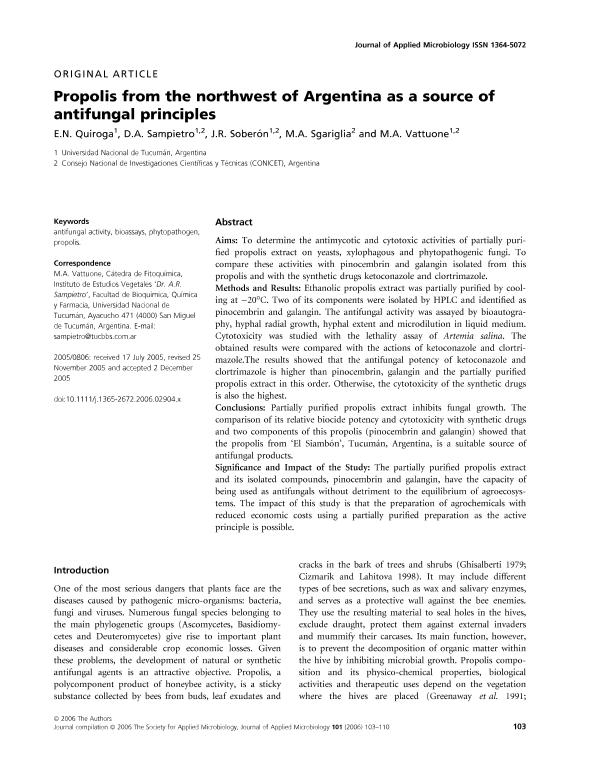Mostrar el registro sencillo del ítem
dc.contributor.author
Quiroga, Emma Nelly

dc.contributor.author
Sampietro, Diego Alejandro

dc.contributor.author
Soberon, Jose Rodolfo

dc.contributor.author
Sgariglia, Melina Araceli

dc.contributor.author
Vattuone, Marta Amelia

dc.date.available
2019-10-23T19:15:07Z
dc.date.issued
2006-07
dc.identifier.citation
Quiroga, Emma Nelly; Sampietro, Diego Alejandro; Soberon, Jose Rodolfo; Sgariglia, Melina Araceli; Vattuone, Marta Amelia; Propolis from the northwest of Argentina as a source of antifungal principles; Wiley Blackwell Publishing, Inc; Journal of Applied Microbiology; 101; 1; 7-2006; 103-110
dc.identifier.issn
1364-5072
dc.identifier.uri
http://hdl.handle.net/11336/87141
dc.description.abstract
AIMS: To determine the antimycotic and cytotoxic activities of partially purified propolis extract on yeasts, xylophagous and phytopathogenic fungi. To compare these activities with pinocembrin and galangin isolated from this propolis and with the synthetic drugs ketoconazole and clortrimazole. METHODS AND RESULTS: Ethanolic propolis extract was partially purified by cooling at -20 degrees C. Two of its components were isolated by HPLC and identified as pinocembrin and galangin. The antifungal activity was assayed by bioautography, hyphal radial growth, hyphal extent and microdilution in liquid medium. Cytotoxicity was studied with the lethality assay of Artemia salina. The obtained results were compared with the actions of ketoconazole and clortrimazole. The results showed that the antifungal potency of ketoconazole and clortrimazole is higher than pinocembrin, galangin and the partially purified propolis extract in this order. Otherwise, the cytotoxicity of the synthetic drugs is also the highest. CONCLUSIONS: Partially purified propolis extract inhibits fungal growth. The comparison of its relative biocide potency and cytotoxicity with synthetic drugs and two components of this propolis (pinocembrin and galangin) showed that the propolis from ´El Siambón´, Tucumán, Argentina, is a suitable source of antifungal products. SIGNIFICANCE AND IMPACT OF THE STUDY: The partially purified propolis extract and its isolated compounds, pinocembrin and galangin, have the capacity of being used as antifungals without detriment to the equilibrium of agroecosystems. The impact of this study is that the preparation of agrochemicals with reduced economic costs using a partially purified preparation as the active principle is possible.
dc.format
application/pdf
dc.language.iso
eng
dc.publisher
Wiley Blackwell Publishing, Inc

dc.rights
info:eu-repo/semantics/openAccess
dc.rights.uri
https://creativecommons.org/licenses/by-nc-sa/2.5/ar/
dc.subject
ANTIFUNGAL ACTIVITY
dc.subject
BIOASSAYS
dc.subject
PHYTOPATHOGEN
dc.subject
PROPOLIS
dc.subject.classification
Otras Ciencias Biológicas

dc.subject.classification
Ciencias Biológicas

dc.subject.classification
CIENCIAS NATURALES Y EXACTAS

dc.title
Propolis from the northwest of Argentina as a source of antifungal principles
dc.type
info:eu-repo/semantics/article
dc.type
info:ar-repo/semantics/artículo
dc.type
info:eu-repo/semantics/publishedVersion
dc.date.updated
2019-09-30T20:43:47Z
dc.journal.volume
101
dc.journal.number
1
dc.journal.pagination
103-110
dc.journal.pais
Reino Unido

dc.journal.ciudad
Oxon
dc.description.fil
Fil: Quiroga, Emma Nelly. Universidad Nacional de Tucumán; Argentina
dc.description.fil
Fil: Sampietro, Diego Alejandro. Universidad Nacional de Tucumán. Facultad de Bioquímica, Química y Farmacia; Argentina. Consejo Nacional de Investigaciones Científicas y Técnicas. Centro Científico Tecnológico Conicet - Tucumán; Argentina
dc.description.fil
Fil: Soberon, Jose Rodolfo. Universidad Nacional de Tucumán. Facultad de Bioquímica, Química y Farmacia. Instituto de Estudios Vegetales; Argentina. Consejo Nacional de Investigaciones Científicas y Técnicas. Centro Científico Tecnológico Conicet - Tucumán; Argentina
dc.description.fil
Fil: Sgariglia, Melina Araceli. Universidad Nacional de Tucumán. Facultad de Bioquímica, Química y Farmacia. Instituto de Estudios Vegetales; Argentina. Consejo Nacional de Investigaciones Científicas y Técnicas. Centro Científico Tecnológico Conicet - Tucumán; Argentina
dc.description.fil
Fil: Vattuone, Marta Amelia. Universidad Nacional de Tucumán. Facultad de Bioquímica, Química y Farmacia; Argentina. Consejo Nacional de Investigaciones Científicas y Técnicas. Centro Científico Tecnológico Conicet - Tucumán; Argentina
dc.journal.title
Journal of Applied Microbiology

dc.relation.alternativeid
info:eu-repo/semantics/altIdentifier/doi/https://dx.doi.org/10.1111/j.1365-2672.2006.02904.x
dc.relation.alternativeid
info:eu-repo/semantics/altIdentifier/url/https://onlinelibrary.wiley.com/doi/full/10.1111/j.1365-2672.2006.02904.x
Archivos asociados
